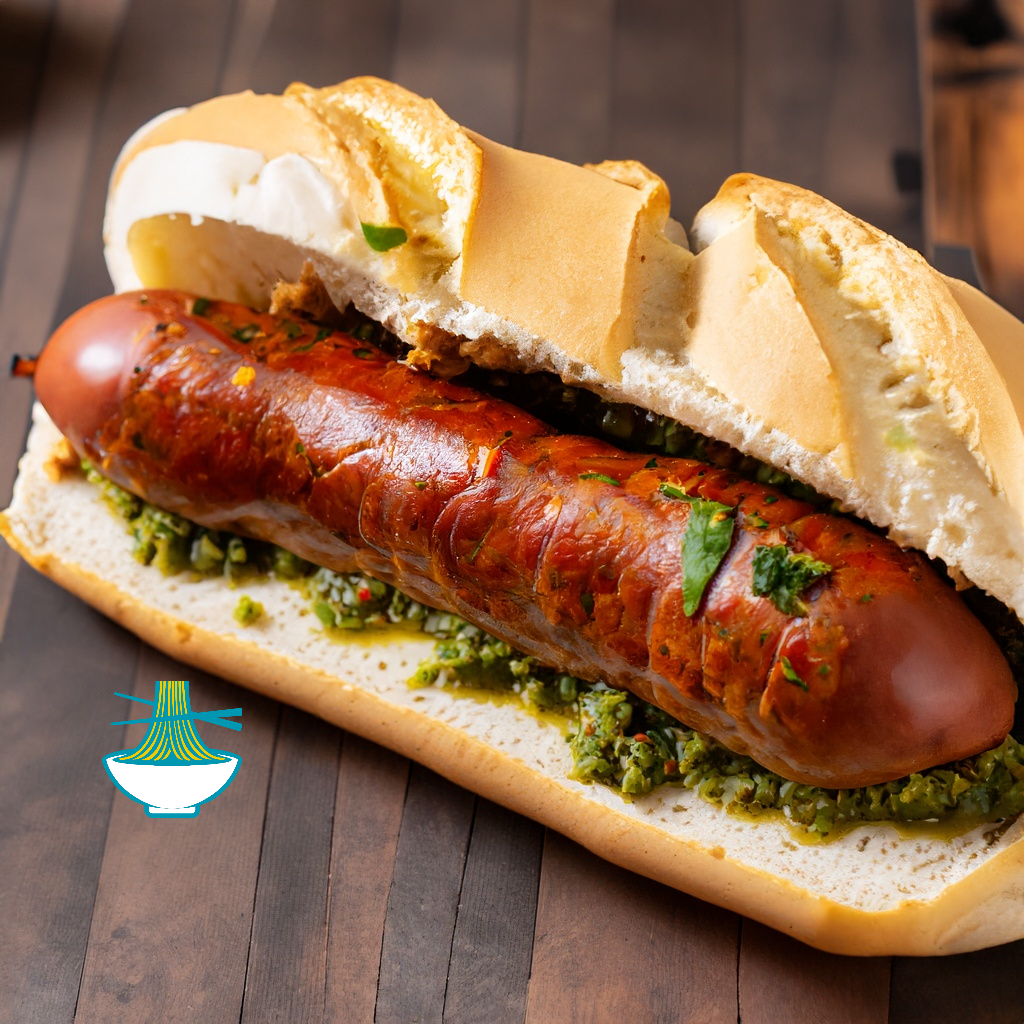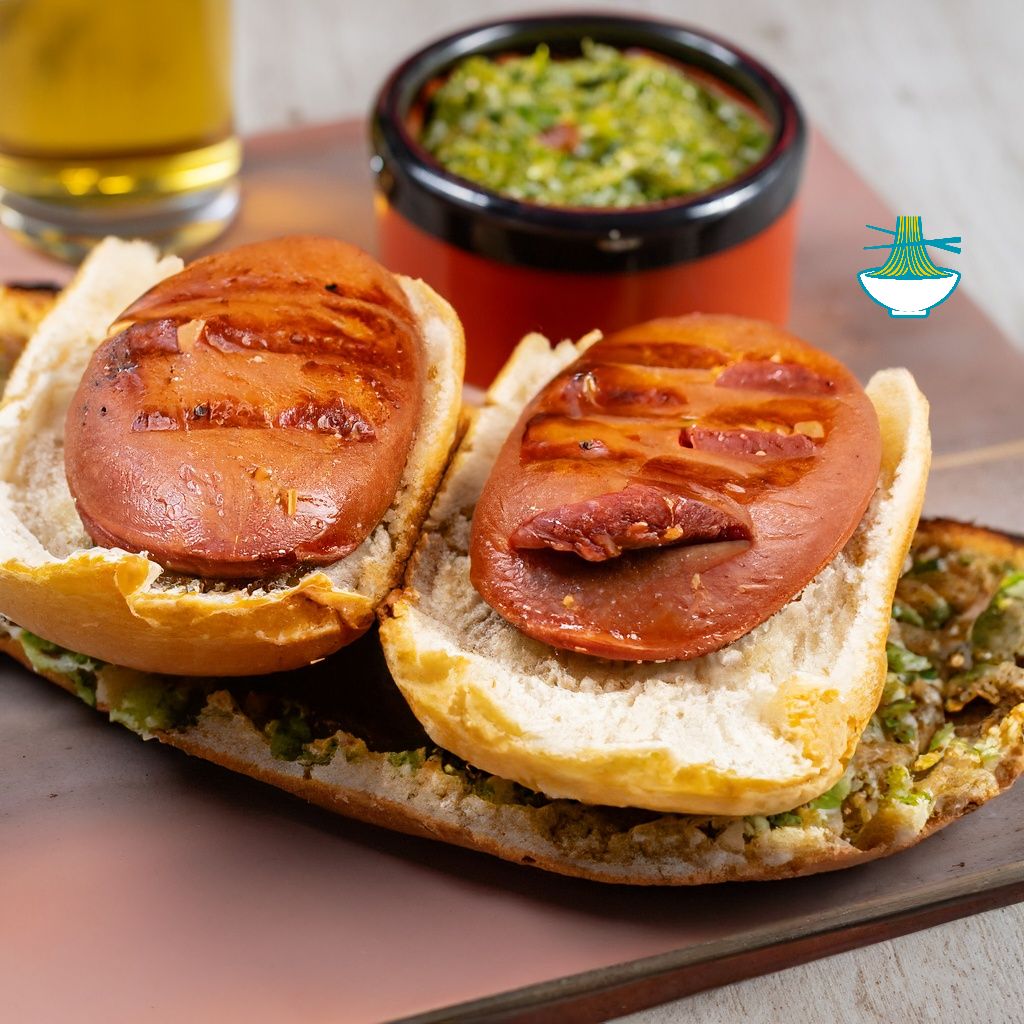Choripan, a cherished street food from Argentina and South America, offers a flavorful blend of textures and tastes that make it a must-try for food enthusiasts. This iconic dish features a grilled chorizo sausage nestled in soft, toasted bread, often accompanied by chimichurri sauce—a zesty blend of fresh herbs, garlic, vinegar, and olive oil. The Argentine chorizo, seasoned with spices like paprika and oregano, provides a smoky and slightly spicy flavor, while the bread absorbs the sausage's savory juices. Rich in proteins, vitamins such as B12, and healthy fats from olive oil, choripan delivers nutritional benefits, though its high sodium and fat content warrant moderation. Its simplicity and robust taste make it a staple at gatherings, festivals, and sports events, capturing the heart of Argentine cuisine.
ingredients:
1- Chorizo sausage
2- Bread rolls
3- Chimichurri sauce (optional)
4- Olive oil
Alternatives to ingredients
- Sausage Alternative: Use chicken or turkey sausage for less fat, or opt for plant-based chorizo for a vegetarian option.
- Bread: Choose whole-grain rolls for added fiber and lower glycemic impact.
- Sauce: Replace chimichurri with a low-sodium version, reducing salt while retaining flavor.
Here is a step-by-step method to make choripan:
1- Heat up a grill or grill pan to medium-high heat.
2- Brush the chorizo sausages with olive oil.
3- Grill the chorizo sausages for 5-7 minutes, turning occasionally, until they are cooked through and have grill marks.
4- While the chorizo is grilling, cut the bread rolls in half and brush the insides with olive oil.
5- Place the bread rolls on the grill and toast them until they are lightly browned.
6- Once the chorizo sausages are cooked, place them in the bread rolls.
7- Drizzle chimichurri sauce on top of the chorizo (if desired).
8- Serve immediately and enjoy!
Note:
You can also add other toppings to your choripan, such as sliced tomatoes, onions, or lettuce. Some people also like to add a dash of hot sauce for some extra heat.
FAQ:
How can I make my Choripan taste better?
- Use fresh ingredients, grill the sausage properly, and enhance the bread with a light toast. Homemade chimichurri can elevate the flavor significantly.
Can Choripan be made healthier?
- Yes, by using leaner sausage, whole-grain bread, and reducing high-sodium ingredients like traditional chimichurri.
What side dishes go well with Choripan?
- Coleslaw, grilled vegetables, or simple salads like a tomato and mozzarella mix enhance the dish.
How do I store leftover Choripan?
- Store sausages and bread separately to prevent sogginess. Reheat before assembling for the best taste.
- Sausages: Store cooked sausages in an airtight container in the fridge for up to 3 days.
- Bread: Keep bread in a breadbox or sealed bag to retain freshness.
- Reheating: Warm sausages on a grill or stovetop to maintain flavor and texture.
Can Choripan be made vegetarian?
- Yes, substitute traditional chorizo with plant-based sausages and ensure all components are vegan-friendly.
- Choripan can be adapted for vegetarians by replacing chorizo with plant-based sausages made from soy or pea protein. Use dairy-free bread and chimichurri for a completely vegan option.
Nutrition Facts (per serving):
Argentinian Choripan Delight
- Calories: 400
- Total Fat: 24g
- Saturated Fat: 8g
- Cholesterol: 45mg
- Sodium: 950mg
- Total Carbohydrates: 30g
- Dietary Fiber: 1g
- Sugars: 3g
- Protein: 14g
Here are the nutrition facts for the ingredients you mentioned:
1. Chorizo sausage (per 100 grams):
- Calories: 455
- Total Fat: 39.3 grams
- Saturated Fat: 14.9 grams
- Trans Fat: 0.4 grams
- Cholesterol: 85 milligrams
- Sodium: 1,500 milligrams
- Carbohydrates: 2.3 grams
- Fiber: 0 grams
- Sugar: 0 grams
- Protein: 23.4 grams
benefits:
- Good source of protein: Chorizo is typically made from pork, providing a good amount of protein, which is essential for muscle growth and repair.
- High in fat and calories: While this can be a downside for some, it can be beneficial for those looking to increase their calorie intake or following a high-fat diet.
- Contains iron and vitamins: Chorizo contains iron, which is important for red blood cell production, as well as various B vitamins.
2. Bread rolls (per average-sized roll):
- Calories: Approximately 120-150 (depending on the size and type of bread roll)
- Total Fat: 1-3 grams (depending on the type of bread roll)
- Saturated Fat: 0.3-0.6 grams (depending on the type of bread roll)
- Trans Fat: 0 grams
- Cholesterol: 0-5 milligrams (depending on the type of bread roll)
- Sodium: 150-250 milligrams (depending on the type of bread roll)
- Carbohydrates: 22-30 grams (depending on the type of bread roll)
- Fiber: 1-3 grams (depending on the type of bread roll)
- Sugar: 1-3 grams (depending on the type of bread roll)
- Protein: 3-5 grams (depending on the type of bread roll)
benefits:
- Source of carbohydrates: Bread rolls are rich in carbohydrates, providing energy for daily activities.
- Some varieties may contain fiber: Whole grain or whole wheat bread rolls can provide fiber, which is important for digestive health.
3. Chimichurri sauce (per 2 tablespoons):
- Calories: Approximately 120-150 (depending on the recipe and serving size)
- Total Fat: 12-15 grams (depending on the recipe and serving size)
- Saturated Fat: 1-2 grams (depending on the recipe and serving size)
- Trans Fat: 0 grams
- Cholesterol: 0-5 milligrams (depending on the recipe and serving size)
- Sodium: 200-300 milligrams (depending on the recipe and serving size)
- Carbohydrates: 2-5 grams (depending on the recipe and serving size)
- Fiber: 0-2 grams (depending on the recipe and serving size)
- Sugar: 0-3 grams (depending on the recipe and serving size)
- Protein: 0-2 grams (depending on the recipe and serving size)
benefits:
- Contains antioxidants: Chimichurri sauce is often made with herbs like parsley and oregano, which are rich in antioxidants that can help protect against cell damage.
- May have anti-inflammatory properties: Some of the herbs and spices in chimichurri sauce, such as garlic, may have anti-inflammatory effects.
4. Olive oil (per tablespoon):
- Calories: 119
- Total Fat: 13.5 grams
- Saturated Fat: 1.9 grams
- Trans Fat: 0 grams
- Cholesterol: 0 milligrams
- Sodium: 0 milligrams
- Carbohydrates: 0 grams
- Fiber: 0 grams
- Sugar: 0 grams
- Protein: 0 grams
benefits:
- Healthy fats: Olive oil is rich in monounsaturated fats, which are considered heart-healthy fats.
- Contains antioxidants: Olive oil contains antioxidants that can help reduce inflammation and protect against chronic diseases.
- May improve heart health: Consuming olive oil as part of a healthy diet may help lower the risk of heart disease.
Nutrition Facts (Per Serving):
- Calories: 400
- Total Fat: 24g
- Protein: 14g
- Sodium: 950mg
Please note that these nutrition facts are approximate and can vary depending on the specific brand, recipe, and serving size. It's always a good idea to check the packaging or recipe details for accurate information.
Choripan is a delicious and satisfying street food that is perfect for outdoor gatherings and barbecues. While it may not be the healthiest option due to its high fat and sodium content, it can be enjoyed as an occasional treat as part of a balanced diet.


Comments